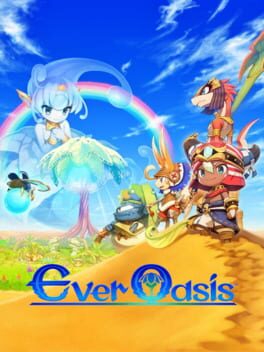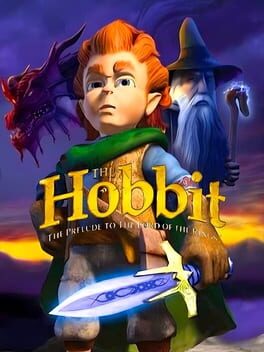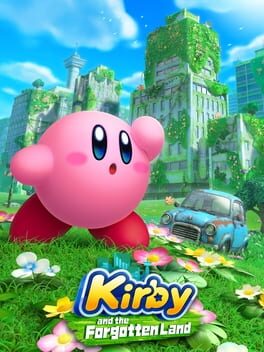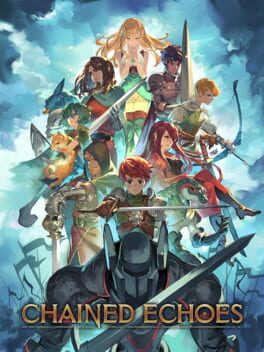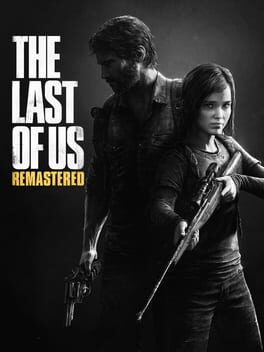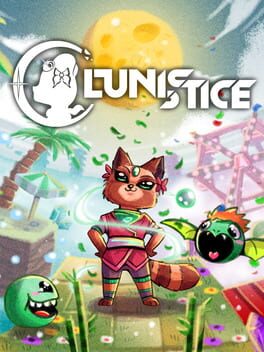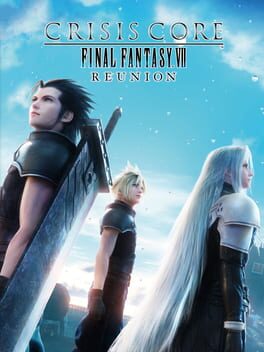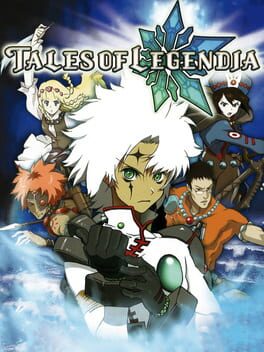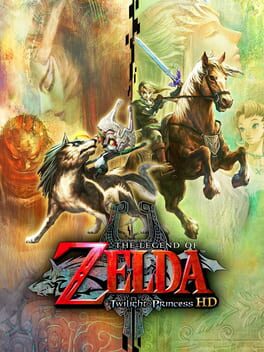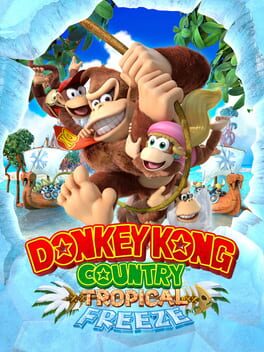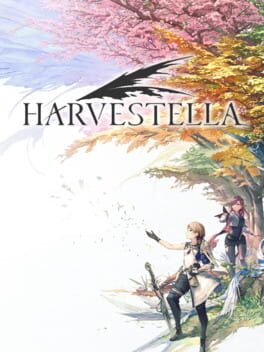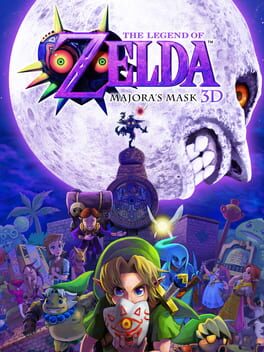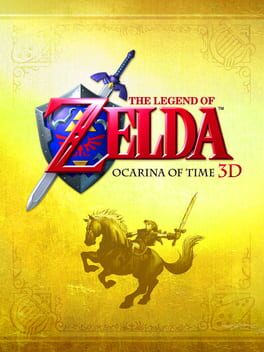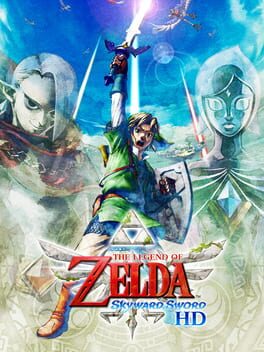ULF
2017
Fairly enjoyable. Decent gameplay loop, but the more the oasis expands the more the repetition piles on itself, day and night cycles ends up going too fast for the formula and both the material farming and dungeon crawling is held back by backtracking and lack of a solid menu for micromanaging.
Other than that it is very charmy, has nice music, and dungeon spelunking in similar fashion to a mana game which was very enjoyable, aside from the fact you need to warp back to the oasis to trade out party members constantly for different abilities to traverse puzzles and obstacles.
Clever game, just not as intuitive as it should've been.
Other than that it is very charmy, has nice music, and dungeon spelunking in similar fashion to a mana game which was very enjoyable, aside from the fact you need to warp back to the oasis to trade out party members constantly for different abilities to traverse puzzles and obstacles.
Clever game, just not as intuitive as it should've been.
2003
A very charming journey through Middle-Earth with challenging puzzle-solving, decent stealth segments (save one) and enchanting levels.
Each level are oozing with visual spectacle well aided by good landmarks/setpieces, decent draw distance and lightning effects with minimal framedrops at a generally safe 30 fps. (at least for the gamecube)
Initially the game can feel rough and clunky, but as you unlock more abilities and gain more hp as well as attack output the gameplay does get better, as long as you take your time to find the scavenged chests hidden on each level.
Amidst linear levels that also tends to be more action packed and story oriented, there are also dungeon-esque areas with many alternate paths and lots of hidden treasure, but the game backs you up with purple crystal collectibles scattered about leading you back on the right course, honestly some of the most clever handhelding I've seen done in an open zone platformer.
Arguably this game might not hold up well to today's fundamental structure, but if you're looking for a good 2000 era adventure game with lots of charm and some finicky mechanics tossed in, and for simply enjoying Lotr, I'd absolutely recommend it.
Each level are oozing with visual spectacle well aided by good landmarks/setpieces, decent draw distance and lightning effects with minimal framedrops at a generally safe 30 fps. (at least for the gamecube)
Initially the game can feel rough and clunky, but as you unlock more abilities and gain more hp as well as attack output the gameplay does get better, as long as you take your time to find the scavenged chests hidden on each level.
Amidst linear levels that also tends to be more action packed and story oriented, there are also dungeon-esque areas with many alternate paths and lots of hidden treasure, but the game backs you up with purple crystal collectibles scattered about leading you back on the right course, honestly some of the most clever handhelding I've seen done in an open zone platformer.
Arguably this game might not hold up well to today's fundamental structure, but if you're looking for a good 2000 era adventure game with lots of charm and some finicky mechanics tossed in, and for simply enjoying Lotr, I'd absolutely recommend it.
It's Kirby in 3D. That's pretty much the game in a nutshell. Didn't personally bother with the challenges seemed like a bit too much of busywork and backtracking for missed collections was a no go with the game locking you and asking you to replay a stage if you missed something. Great bossfights and some amazing standout stages amidst some typical ones. Some ideas went reused a bit too much toward the end, but upgrading power ups was a neat addition.
Fun, and also very challenging if you should decide to go for completion.
Fun, and also very challenging if you should decide to go for completion.
2022
It's hard to fault a game made by such a small team. And what's even more impressive is that there isn't much to criticise. The world of Vlandis is amazing with a visual style strongly inspired by Chrono Cross and Xenogears, while its open world structure strikes in the same league as the Xenoblade series.
The cast is overall very likeable with their own distinct down to earth personalities and great backstories. There's occasional real-time banters through dungeons and areas which added some nice chemistry and life to the characters.
Exploring and sidequesting was a great time, and while I initially didn't expect to go all out doing everything, the game was so coherent and well designed I felt encouraged to so all the way.
The combat system is divided into two sections for ground combat and Gears both working well and forcing you to make sure how to play optimally and making sure you exploit enemy weakspots be it elemental or raw damage and keeping your stats aligned with buffs and debuffs, while making sure you rationalise your technical points properly. There's always a high stake, until you actually decide to gear up with fully optimised builds and the battles goes by faster and more about bursting out high aoe damage.
The level system is ingenious and lets you add attribute boosts or character skills after beating bosses, which you thereby can level up from normal combats.
The soundtrack is fantastic and really hits it with nods here and there to other classic jrpgs and the sound design is excellent with environmental effects and satisfying footsteps varying sound effects on the different soil you venture through.
The gear optimisation process is really my big nag with this game.
Farming materials for weapon upgrades was unecessarily painful since dungeons don't sport any form of fast travelling and enemies don't respawn unless you're re-entering the entire dungeon. This is a problem since some of the desired enemies are far into dungeons with rare drop materials.
The gem system was a clunky process with a very unintuitive menu interface. And both combining and slotting gems to gears for extra skills or attributes was a tedious process. Although the variety of gears at least wasn't as massive so it was more of a onetime event as I breezed through the last act with fully optimised builds.
The story while having amazing concepts and set pieces had a bit too much going on to really emphasise all of its elements especially towards the last act where some character moments felt a bit underutilised.
The final act throws a lot of the ideas at once without much time for more exposition leaving the ending a bit rough, and I still feel like I'm on the fence about how the game decided to conclude.
Overall though Chained Echoes is a mostly fundamentally stellar and well composed jrpg I'd gladly recommend to anyone who wants something akin to the old classics.
The cast is overall very likeable with their own distinct down to earth personalities and great backstories. There's occasional real-time banters through dungeons and areas which added some nice chemistry and life to the characters.
Exploring and sidequesting was a great time, and while I initially didn't expect to go all out doing everything, the game was so coherent and well designed I felt encouraged to so all the way.
The combat system is divided into two sections for ground combat and Gears both working well and forcing you to make sure how to play optimally and making sure you exploit enemy weakspots be it elemental or raw damage and keeping your stats aligned with buffs and debuffs, while making sure you rationalise your technical points properly. There's always a high stake, until you actually decide to gear up with fully optimised builds and the battles goes by faster and more about bursting out high aoe damage.
The level system is ingenious and lets you add attribute boosts or character skills after beating bosses, which you thereby can level up from normal combats.
The soundtrack is fantastic and really hits it with nods here and there to other classic jrpgs and the sound design is excellent with environmental effects and satisfying footsteps varying sound effects on the different soil you venture through.
The gear optimisation process is really my big nag with this game.
Farming materials for weapon upgrades was unecessarily painful since dungeons don't sport any form of fast travelling and enemies don't respawn unless you're re-entering the entire dungeon. This is a problem since some of the desired enemies are far into dungeons with rare drop materials.
The gem system was a clunky process with a very unintuitive menu interface. And both combining and slotting gems to gears for extra skills or attributes was a tedious process. Although the variety of gears at least wasn't as massive so it was more of a onetime event as I breezed through the last act with fully optimised builds.
The story while having amazing concepts and set pieces had a bit too much going on to really emphasise all of its elements especially towards the last act where some character moments felt a bit underutilised.
The final act throws a lot of the ideas at once without much time for more exposition leaving the ending a bit rough, and I still feel like I'm on the fence about how the game decided to conclude.
Overall though Chained Echoes is a mostly fundamentally stellar and well composed jrpg I'd gladly recommend to anyone who wants something akin to the old classics.
I'm sure it's a great game, really enjoyed the post apocalyptic premise, narrative and seemingly strong character writing, but survival-stealth really isn't my cup of tea and I couldn't be arsed to play further when I finalIy decided I should stop pushing myself through when I'm not enjoying the core gameplay whatsoever.. so guess I'll watch an lp of it for the otherwise compelling story oh well..
2022
God I'm tired. Don't get me wrong, Breath of the Wild is one great colossal game with an examplary open world foundation many brethrens wishes to imitate.
The landscapes are diverse and beautiful, with an amount of technical finesse which offers so much optional freedom for multiple replays. No single journey is going to be the same, be it your technical prowess, revelations or how the game hands itself over to you with its dynamic weather climate, funny enemy ai and other weird oddities one may discover.
You can freely choose where and how you wish to progress any time after the introductory segment, and the real cherry on top lies with the tools you are given and their wide range of usages. There's exploitable and roundabouts ways to solve puzzles, to the point that the simple straightforward answer might go over your head.
While the main campagn is short, it does offer 4 main dungeons, cool locales with their transpiring stories, but the real meat and bones of botw lies in searching out for Shrines (mini dungeons), koroks spread all out over the damn place. And beating sub bosses for good materials to uograde your gears that you may or may not find while exploring hyrule. It's an addicting and immersive endeavour that can keep you sinked in Botw for 100s of hours.
That being said, the dungeon design (even the main dungeons) isn't too aestetically diverse and some obtuse design of finding certain shrines and solving riddles alongside myriads of npc sidequests are hardly worth the effort due to underwhelming rewards, which can be be a real test of your patience and sanity.
While the landscapes are absolutely gorgeous with distinct landmarks and a cohesively laid out world map, the areas themselves usually either consists of shrine areas, (these are the areas that generally stands out)
goblin/lizard lairs or stables. This is how it is for a good sum of the world map and once you notice the constant pattern it can get predictable, mundane and at times...boring.
Poor weapon durability is a thing and you constantly need to swap out and either hold on to, or farm new weapons with a good output, which thankfully is remedied by enemies scaling both in hp, damage output as well as being armed with better weapons as you complete more shrines and unlock towers. The merit is that you have to keep a sense of rationality with your weapon inventory and an insentive to unlock more weapon slots, on the other hand it is a constant annoyance almost every combat when weapons also lose their durability fast against stronger enemies which you will constantly encounter late game.
Enemy variety frankly isn't really too great either. And by the quarter mark you probably will have seen most of them.
Half of the shrines are comprised of either 1v1 gauntlets with the same single enemy or hallways leading you straight to the goal, while the quests themselves for finding the shrines serves as the replacements.
I prefer my traditional more compact Zelda so I wouldn't even rank this top 5 of the franchise, but as a game on its own merits, botw is a good entry with untapped potential and faulty aspects below its adamant surface, which Botw 2 probably will remedy and build on.
The landscapes are diverse and beautiful, with an amount of technical finesse which offers so much optional freedom for multiple replays. No single journey is going to be the same, be it your technical prowess, revelations or how the game hands itself over to you with its dynamic weather climate, funny enemy ai and other weird oddities one may discover.
You can freely choose where and how you wish to progress any time after the introductory segment, and the real cherry on top lies with the tools you are given and their wide range of usages. There's exploitable and roundabouts ways to solve puzzles, to the point that the simple straightforward answer might go over your head.
While the main campagn is short, it does offer 4 main dungeons, cool locales with their transpiring stories, but the real meat and bones of botw lies in searching out for Shrines (mini dungeons), koroks spread all out over the damn place. And beating sub bosses for good materials to uograde your gears that you may or may not find while exploring hyrule. It's an addicting and immersive endeavour that can keep you sinked in Botw for 100s of hours.
That being said, the dungeon design (even the main dungeons) isn't too aestetically diverse and some obtuse design of finding certain shrines and solving riddles alongside myriads of npc sidequests are hardly worth the effort due to underwhelming rewards, which can be be a real test of your patience and sanity.
While the landscapes are absolutely gorgeous with distinct landmarks and a cohesively laid out world map, the areas themselves usually either consists of shrine areas, (these are the areas that generally stands out)
goblin/lizard lairs or stables. This is how it is for a good sum of the world map and once you notice the constant pattern it can get predictable, mundane and at times...boring.
Poor weapon durability is a thing and you constantly need to swap out and either hold on to, or farm new weapons with a good output, which thankfully is remedied by enemies scaling both in hp, damage output as well as being armed with better weapons as you complete more shrines and unlock towers. The merit is that you have to keep a sense of rationality with your weapon inventory and an insentive to unlock more weapon slots, on the other hand it is a constant annoyance almost every combat when weapons also lose their durability fast against stronger enemies which you will constantly encounter late game.
Enemy variety frankly isn't really too great either. And by the quarter mark you probably will have seen most of them.
Half of the shrines are comprised of either 1v1 gauntlets with the same single enemy or hallways leading you straight to the goal, while the quests themselves for finding the shrines serves as the replacements.
I prefer my traditional more compact Zelda so I wouldn't even rank this top 5 of the franchise, but as a game on its own merits, botw is a good entry with untapped potential and faulty aspects below its adamant surface, which Botw 2 probably will remedy and build on.
Although mundane and monotone with its dungeon design, high frequent battle encounters and a writing occasionally suffering from cheesy and akward dialogues constantly making it apparent this is a remake of an old psp game, Crisis Core still has fun and flashy combat with some really cool story segments, as well as neat gameplay tweaks and additions. Although the sidequest missions completely broke the game in half and made the entire main campaign a breeze to play through it was still a fun ride and catering to quench the appetite until the upcoming Rebirth.
2005
Tales of Legendia is one long-ass piece of game following the traditional Tales of formula down to a tee.
The chibi artstyle is cute and the voice acting was pretty ace with cast members like Cam Clarke and Shiloh Strong. A fairly enjoyable cast, although some gags got pretty repetetive and I have no idea why everyone had to pick on Moses the entire fucking game.
The second half of the game however cuts the entire voice acting and goes on with individual character subplots while pulling a bravely default ala recycling the entire game. You're basically playing the same game twice, although the post game story at least had a more interesting plot going on, though it got very monotonous.
The Forest of No return dungeon sucked ASS. And the other dungeons were basically the same tunnely designs with an okay 2D battlesystem. I liked the flanking mechanic although some enemies at late game got ridiculously spongy and it was more button spammy and stiff, moreso than timing your movement and spacing like in other tales of games.
The first 30 hours or so comprises the main story chapters until the credits while following a longwinded damsel in distress plot. Though there's some good moments and you always went forward to new areas.
The orchestrated soundtrack definitely helped the experience.
The main story easier to recommend than the 40 + hour postgame following after the credits. It's a decent run if you want some traditional tales of, even if it's not the best one, it still packs some charm.
The chibi artstyle is cute and the voice acting was pretty ace with cast members like Cam Clarke and Shiloh Strong. A fairly enjoyable cast, although some gags got pretty repetetive and I have no idea why everyone had to pick on Moses the entire fucking game.
The second half of the game however cuts the entire voice acting and goes on with individual character subplots while pulling a bravely default ala recycling the entire game. You're basically playing the same game twice, although the post game story at least had a more interesting plot going on, though it got very monotonous.
The Forest of No return dungeon sucked ASS. And the other dungeons were basically the same tunnely designs with an okay 2D battlesystem. I liked the flanking mechanic although some enemies at late game got ridiculously spongy and it was more button spammy and stiff, moreso than timing your movement and spacing like in other tales of games.
The first 30 hours or so comprises the main story chapters until the credits while following a longwinded damsel in distress plot. Though there's some good moments and you always went forward to new areas.
The orchestrated soundtrack definitely helped the experience.
The main story easier to recommend than the 40 + hour postgame following after the credits. It's a decent run if you want some traditional tales of, even if it's not the best one, it still packs some charm.
The tingling excitement of finally getting to play this game back on christmas in 2006 after an infinite period of prolonged delays still remains unmatched for me and is a feeling that always rekindles every time I decide to revisit Twilight Princess.
It's not the most unique Zelda game, and it is probably the most linear adventure in the series with a weirdly stretched out, but heavily underutilised overworld, but what it does well is absolutely everything else from its well designed dungeons, locales and epic narration, as well as introducing some really cool new items at the final half of the game.
The story is beautifully presented with well animated cutscenes, and a strong synced up soundtrack that hits the sweetspots at the right moments.
The mood in this game strikes with every note from its sweet and touchy moments to the darker and grittier which complements the entirety of the journey so well.
The HD remaster adds a decent amount of textures and added polygons which really makes Twilight Princess look a lot less muddy than its original predecessors on Gamecube and Wii.
The input latency is unfortunately a bit iffy and is especially noticeable when riding epona or when you want to change directions, it's weird , but not too intrusive except for a few moments when you're at tight platforms and need extra precision.
Other than that there's several additions that just makes me prefer HD, faster climbing animation, gyro aiming plus a realtime map and menu with the gamepad is easily a go to.
Oh, and Midna best sidekick.
It's not the most unique Zelda game, and it is probably the most linear adventure in the series with a weirdly stretched out, but heavily underutilised overworld, but what it does well is absolutely everything else from its well designed dungeons, locales and epic narration, as well as introducing some really cool new items at the final half of the game.
The story is beautifully presented with well animated cutscenes, and a strong synced up soundtrack that hits the sweetspots at the right moments.
The mood in this game strikes with every note from its sweet and touchy moments to the darker and grittier which complements the entirety of the journey so well.
The HD remaster adds a decent amount of textures and added polygons which really makes Twilight Princess look a lot less muddy than its original predecessors on Gamecube and Wii.
The input latency is unfortunately a bit iffy and is especially noticeable when riding epona or when you want to change directions, it's weird , but not too intrusive except for a few moments when you're at tight platforms and need extra precision.
Other than that there's several additions that just makes me prefer HD, faster climbing animation, gyro aiming plus a realtime map and menu with the gamepad is easily a go to.
Oh, and Midna best sidekick.
Tropical Freeze is automatically better than its predecessor due to button mapped controls and overall less trial and error design.
Generally an easier game, though the Kong levels are certainly not.
David Wise's compositions are your typical earmelters with bungabunga bangers and the level themes are more unique and gives Tropical Freeze more of an identity of its own.
When you get stuck in random animations like bouncing off walls by simply tapping the wall in midair or sliding at slopes or ice and being unable to cancel out with rolls it can be pretty damn frustrating. This happened a lot to me in the final world, the ice drifting was not a very pleasant combination to the mechanics. And I honestly don't like the final world since it leans back towards the trial and error design again.
Outside of that, I adore all the variety and otherwise excellent level design Tropical Freeze offers and it's easily one of my favourite 2D platformers, very much so as DKC 1 and 2 in most merits.
Generally an easier game, though the Kong levels are certainly not.
David Wise's compositions are your typical earmelters with bungabunga bangers and the level themes are more unique and gives Tropical Freeze more of an identity of its own.
When you get stuck in random animations like bouncing off walls by simply tapping the wall in midair or sliding at slopes or ice and being unable to cancel out with rolls it can be pretty damn frustrating. This happened a lot to me in the final world, the ice drifting was not a very pleasant combination to the mechanics. And I honestly don't like the final world since it leans back towards the trial and error design again.
Outside of that, I adore all the variety and otherwise excellent level design Tropical Freeze offers and it's easily one of my favourite 2D platformers, very much so as DKC 1 and 2 in most merits.
2022
Harvestella is one of those games that instantly grabbed me with its charming artstyle and vibrant landscapes.
Similar to Rune Factory, Harvestella blends hacknslash with farming simulation with enough depth to last out its 70 hour plus span.
There's a continuous growth in both aspects with skilltrees and added abilities for combat as there are tools, facilities and tons of recipes to gather for crafting and cooking, as well as levelling up abilities for farming throughout clearing different achievements.
That being said, there's also some areas of simplicity with minuscule gear customising and a glaring lack of parrying for the dungeon crawling.
Meanwhile the farming doesn't really offer too much variety in seeds or farm animals other than cufflows (fluffy chickens) and Woollums (more fluffy goats).
In the end the farming aspect serves as a hub simply for gathering foods and buffs to keep both your health and endlessly depleting stamina gauge up for your dungeon spelunking and if you play it right you honestly don't need to do much self managing with your farm when you craft more tools than can even do the work for you.
While the game starts out slow and sluggish, the story slowly strays through some typical plotlines, which thankfully is aided by some inventive twists and a likeable cast as you get past the early chapters and you start affinity bonding with your party members for some heartfelt individual stories. The interactions are mainly through the side characters to the main character and not as much bantering between the party itself, but it does work surprisingly well in the context of how the game has you generally in the center of the narration.
The lack of voice acting and overabundance of stock animation does hurt some of the experience alongside some chuggy framedips. It's a bummer considering how well written the story is towards the second half and how spectular the presentation can get for a few key events and especially for the bossfights.
While you will hear some tracks being replayed a bit too much in some cutscenes and even recycled at some dungeons, the individual tracks are by themselves nicely orchestrated pieces composed by Go Shiina and past chapter 3 the variety does get a lot better with some fantastic dungeon themes.
I really enjoyed my time with Harvestella and while the presentation can at times be sub par for it's steep pricing, Harvestella is loaded with lots of content, decent gameplay and a charming artistic style that may make it's steep admission worthwhile if you tolerate a few glaring rough spots.
Similar to Rune Factory, Harvestella blends hacknslash with farming simulation with enough depth to last out its 70 hour plus span.
There's a continuous growth in both aspects with skilltrees and added abilities for combat as there are tools, facilities and tons of recipes to gather for crafting and cooking, as well as levelling up abilities for farming throughout clearing different achievements.
That being said, there's also some areas of simplicity with minuscule gear customising and a glaring lack of parrying for the dungeon crawling.
Meanwhile the farming doesn't really offer too much variety in seeds or farm animals other than cufflows (fluffy chickens) and Woollums (more fluffy goats).
In the end the farming aspect serves as a hub simply for gathering foods and buffs to keep both your health and endlessly depleting stamina gauge up for your dungeon spelunking and if you play it right you honestly don't need to do much self managing with your farm when you craft more tools than can even do the work for you.
While the game starts out slow and sluggish, the story slowly strays through some typical plotlines, which thankfully is aided by some inventive twists and a likeable cast as you get past the early chapters and you start affinity bonding with your party members for some heartfelt individual stories. The interactions are mainly through the side characters to the main character and not as much bantering between the party itself, but it does work surprisingly well in the context of how the game has you generally in the center of the narration.
The lack of voice acting and overabundance of stock animation does hurt some of the experience alongside some chuggy framedips. It's a bummer considering how well written the story is towards the second half and how spectular the presentation can get for a few key events and especially for the bossfights.
While you will hear some tracks being replayed a bit too much in some cutscenes and even recycled at some dungeons, the individual tracks are by themselves nicely orchestrated pieces composed by Go Shiina and past chapter 3 the variety does get a lot better with some fantastic dungeon themes.
I really enjoyed my time with Harvestella and while the presentation can at times be sub par for it's steep pricing, Harvestella is loaded with lots of content, decent gameplay and a charming artistic style that may make it's steep admission worthwhile if you tolerate a few glaring rough spots.
A great remake with some extra spice, qol improvements and changed up bossfights. I personally adore this version as much as the original and having two different alterations of one of my favourite games of all time is a good thing in my book.
I prefer the bossfights in this version! I honestly wished they actually spiced up the final boss too since he's so disappointedly piss easy and was the only unchanged boss from the original.
As for Zora Link...yes..it was an unnecessary change. He has a new neutral swimming with a somewhat slower speed in addition to his original faster swimming which now drains magic, but you can thankfully nullify that completely with Chateau Romani milk. It doesn't drag down anything for me, but it's definitely a dumb obstacle for newcomers in a version that I otherwise would recommend starting out with before the original because of a much more streamlined journal pointing you through some otherwise obscure sidequests!
I prefer the bossfights in this version! I honestly wished they actually spiced up the final boss too since he's so disappointedly piss easy and was the only unchanged boss from the original.
As for Zora Link...yes..it was an unnecessary change. He has a new neutral swimming with a somewhat slower speed in addition to his original faster swimming which now drains magic, but you can thankfully nullify that completely with Chateau Romani milk. It doesn't drag down anything for me, but it's definitely a dumb obstacle for newcomers in a version that I otherwise would recommend starting out with before the original because of a much more streamlined journal pointing you through some otherwise obscure sidequests!
An excellent remake of one of the best games ever made. Ocarina of time is well paced, slicker and better with 60 fps, faster dialogs, vastly improved textures and polygons with a 4 mapping item menu. And a rich soundtrack beautifully boosted with the virtual surround setting. Gyrocontrols for aiming is also a nice addition! Such a joy to play and always come back to.
Skyward Sword hosts some of the series best elements coupled with some very polarising design choices both mechanically and in its progressive structure.
The motion control is a drive featured throughout the entire game through all of Link's arsenal and swordplay as well as the first debut of the stamina system, which completely shifts the gameplay in a way you'll either love or hate.
The HD version gives you a toggle option for replacing the motion controls with directional inputs from the right analog as well as toggling off the gyro controls for aiming if you so wish, it's a nice option and it does the job, although personally I find the motion controls are so well implemented and such a huge aspect of the game that I would recommend playing it the way it originally was designed to.
The presentation is top notch with a nice blend of vibrant celshading together with the same type of character artstyle from Twilight Princess. As well as the environments having good individual designs and landmarks that sets them apart, especially the dungeons. The soundtrack is also fully orchestrated with some superb compositions.
Skyward Sword is one of the longest games in the series and it's unfortunate that a good chunk of the journey is bloated with backtracking and padded out fetch quests and npc expositions.
While the game mostly keeps things fresh with new things to do and new puzzles to solve it is a shame its all restricted to the same areas you already have seen as you reach the majority of the second and third act of the game.
The best part about Skyward Sword is the sheer creatitivy and originality that sets it on it's own legs apart from its other entries, there's new concepts and weapons, a new weapon crafting system, great dungeons and fun sidequesting in Skyloft with charming npcs to a similar in-depth extent as the npcs in Majora's Mask and some fun minigames as well as some of the best bossfights in the series.
Despite the compromised scope and unsteady pacing, there's plenty of LoZ best moments in Skyward Sword.
The motion control is a drive featured throughout the entire game through all of Link's arsenal and swordplay as well as the first debut of the stamina system, which completely shifts the gameplay in a way you'll either love or hate.
The HD version gives you a toggle option for replacing the motion controls with directional inputs from the right analog as well as toggling off the gyro controls for aiming if you so wish, it's a nice option and it does the job, although personally I find the motion controls are so well implemented and such a huge aspect of the game that I would recommend playing it the way it originally was designed to.
The presentation is top notch with a nice blend of vibrant celshading together with the same type of character artstyle from Twilight Princess. As well as the environments having good individual designs and landmarks that sets them apart, especially the dungeons. The soundtrack is also fully orchestrated with some superb compositions.
Skyward Sword is one of the longest games in the series and it's unfortunate that a good chunk of the journey is bloated with backtracking and padded out fetch quests and npc expositions.
While the game mostly keeps things fresh with new things to do and new puzzles to solve it is a shame its all restricted to the same areas you already have seen as you reach the majority of the second and third act of the game.
The best part about Skyward Sword is the sheer creatitivy and originality that sets it on it's own legs apart from its other entries, there's new concepts and weapons, a new weapon crafting system, great dungeons and fun sidequesting in Skyloft with charming npcs to a similar in-depth extent as the npcs in Majora's Mask and some fun minigames as well as some of the best bossfights in the series.
Despite the compromised scope and unsteady pacing, there's plenty of LoZ best moments in Skyward Sword.
